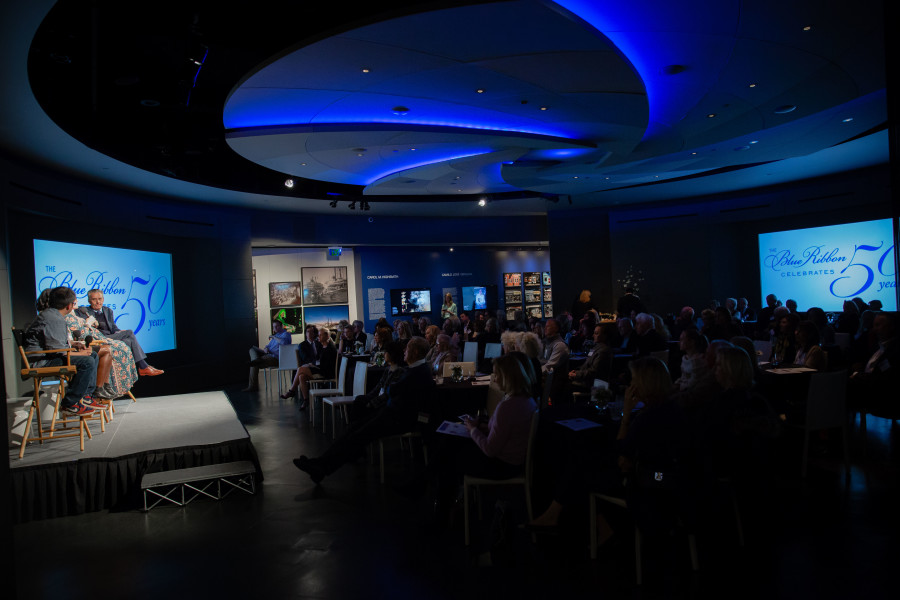L.A. Playwrights Get Blue Ribbon Certified
A Conversation on Theatre, Patronage, and What It Means to Be a Playwright

Theatre thrives on patronage; not just from audiences, but from donors and institutions who have a stake in keeping the stage lights on. In the spirit of artistic philanthropy, The Blue Ribbon—The Music Center’s premier women’s support organization—celebrated 50 years of giving by hosting a series of events spotlighting the resident companies. Center Theatre Group’s “The Art of the Playwright,” a panel moderated by Artistic Director Michael Ritchie, took place at the Annenberg Space for Photography on May 1, 2018.
Playwrights Eliza Clark, Janine Nabers, and Qui Nguyen discussed their careers and the role Center Theatre Group’s L.A. Writers’ Workshop has played in their work. The Writers’ Workshop provides artists with a year-long residency to develop a new play while also fostering a larger community of writers working in Southern California.
The panelists opened by discussing their personal and professional origins. Clark, who grew up in Connecticut, got an early start in professional theatre, working as a child actor who first appeared Off-Broadway at the age of 6. Nguyen’s writerly start is a more familiar one: at age 16, he had a crush on a girl who was a writer, and feigned interest to try and woo her. I’ve been kind of pretending to be a writer ever since, and luckily no one has figured me out,
he joked.
It was Nabers’ path that most unexpectedly veered toward the arts: an aspiring track and field runner, Nabers wrote a letter to her idol, Olympian Jackie Joyner-Kersee. Nabers eventually got a call back from Joyner-Kersee, who told her, If you don’t become a track runner in the Olympics, you should consider becoming a writer.
A knee injury eventually crystallized Nabers’ choice.
All three began their playwriting careers in New York. I thought I was just going to fail,
joked Nguyen, who ended up creating his own theatre company, Vampire Cowboys. When I started doing theatre in New York, I just made this assumption that—because of the things I was interested in—no one would ever produce it, so I just had to produce it myself.
Television writing brought the playwrights to Los Angeles, lured by the promise of a steady gig. But their hearts are still in the theatre. Playwriting feels like an art—even though it is also my job,
Clark said, but I can’t force it the way that I sort of can force it when I’m writing television.
Turning to the subject of professional support for their work, all three panelists revelled in their experiences in Center Theatre Group’s L.A. Writers’ Workshop. I weirdly don’t love writing groups,
said Clark, but I loved the Center Theatre Group writing group.
Nguyen highlighted the value of the tight-knit community that develops there. I can sit by myself in a room and write a play, but that doesn’t necessarily motivate me to write a play,
he said. As soon as I go into a room [of playwrights], I know there’s another person who has gone through what I’ve gone through. I immediately know that kinship.
The piece Clark began at the Writers’ Workshop, Quack, will make its World premiere at the Kirk Douglas Theatre October 21 – November 18, 2018. This, for Ritchie, is the ultimate goal of supporting playwrights. A lot of playwrights get commissioned and developed and sometimes that first reading is considered the victory lap,
he said. And I’d like to think that we really pursue a production. Ultimately it is getting that play on the stage that matters.
Clark agreed. I think a lot of fancy theatres use development and readings as a way to showcase that they care about new voices without actually supporting new voices in production,
she said.
Perhaps this is in part a reflection of the current state of commercial theatre, which the playwrights all find frustrating. Nabers argued that the rise of film and television shifted the focus of many talented artists. The great playwrights of the 20th century were writing plays because they had to survive,
said Nabers. Now it seems as though a lot of people are writing plays for other reasons, or because they’re distracted.
Nguyen pointed to “the lack of risk-taking” that prevails today. Once upon a time, the play was just good,
and that was enough to make it to Broadway, he said. Now it’s like ‘Oh they’re never going to come in from Connecticut to go see this unless it’s something that they already know.’
Lucky for Los Angeles, and thanks in part to the long-time support of patrons like The Blue Ribbon, we’re not purely at Broadway’s mercy, and artists like Clark, Nabers, and Nguyen have a space at Center Theatre Group to advance their craft.
Listen to the full Q&A on our podcast.
